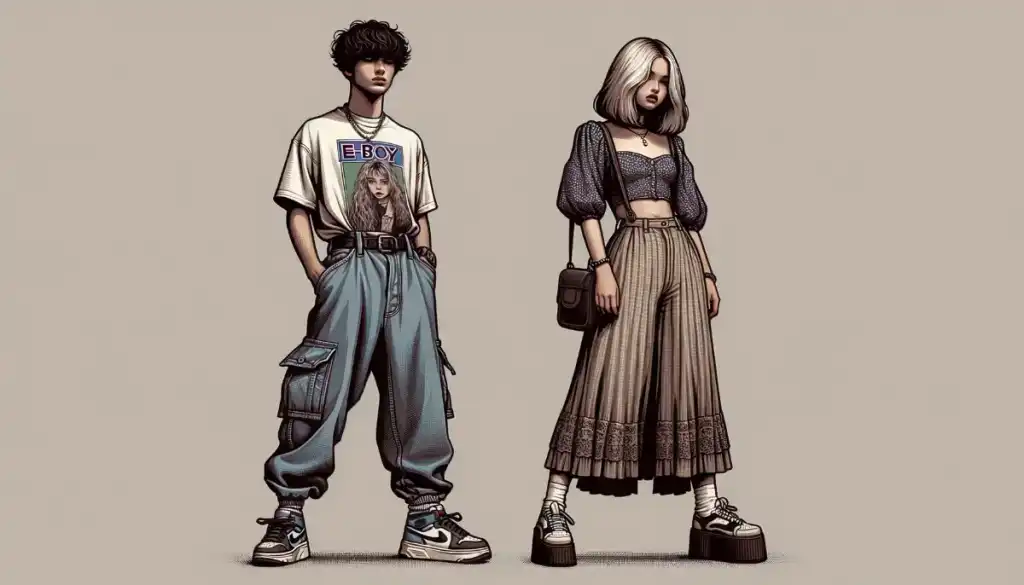Discover the Fashion Zeitgeist: Gen Z Vs Millennial Style
In the realm of fashion, the generational divide between Gen Z and Millennials is not just a matter of age; it’s a reflection of distinct cultural influences, technological advancements, and shifting societal values. While both cohorts share certain sartorial sensibilities, there are nuanced differences that distinguish their respective fashion preferences. To truly understand the disparity between Gen Z and Millennial fashion, one must delve into the historical context, socio-economic factors, and the impact of digitalization on consumer behavior.
Generational Influences on Fashion

Millennials, born roughly between the early 1980s and mid-1990s, came of age during a time of significant technological advancement and globalization. This generation witnessed the rise of fast fashion brands, such as H&M and Zara, which offered trendy clothing at affordable prices. The influence of celebrities and pop culture icons, epitomized by figures like Britney Spears and Justin Timberlake, shaped Millennial fashion with its emphasis on casual yet stylish attire.
In contrast, Gen Z, born from the mid-1990s to the early 2010s, has grown up in a digital age characterized by social media, smartphones, and instant access to information. This generation is more socially conscious and environmentally aware, factors that have influenced their fashion choices. Gen Z looks to influencers and online communities for style inspiration, favoring authenticity and sustainability over mass-produced trends.
Key Differences in Fashion Preferences

One notable difference between Gen Z and Millennial fashion lies in their approach to individuality and self-expression. Millennials often embraced a mix-and-match aesthetic, combining vintage pieces with contemporary staples to create eclectic looks. They gravitated towards athleisure wear, oversized silhouettes, and nostalgic nods to ’90s fashion.
On the other hand, Gen Z tends to favor a more curated and minimalist style, characterized by clean lines, neutral colors, and functional clothing. This generation values versatility and pragmatism, opting for pieces that can transition seamlessly from day to night. Streetwear influences, inspired by brands like Supreme and Off-White, are prominent among Gen Z fashionistas, reflecting their urban sensibilities and penchant for edgy, yet understated, attire.
The rise of gender-neutral fashion is another significant trend that distinguishes Gen Z from Millennials. While Millennials challenged traditional gender norms through their fashion choices, Gen Z takes it a step further by embracing unisex clothing brands and advocating for greater inclusivity in the fashion industry. This shift towards gender fluidity reflects the evolving attitudes towards identity and diversity among younger consumers.
The Role of Technology and Social Media

Technology plays a pivotal role in shaping the fashion landscape for both Gen Z and Millennials. Social media platforms like Instagram, TikTok, and Pinterest serve as virtual runways where individuals showcase their personal style and discover new trends. Influencer marketing has become a dominant force in the fashion industry, with brands collaborating with digital creators to reach younger audiences.
For Millennials, platforms like Instagram provided a platform for self-expression and community building, fueling the rise of fashion bloggers and DIY culture. However, Gen Z has taken social media influence to new heights, leveraging platforms like TikTok to dictate trends and challenge conventional beauty standards. The democratization of fashion through user-generated content has empowered Gen Z to redefine the boundaries of style and create their own fashion narratives.
Sustainability and Ethical Fashion

One area where Gen Z diverges significantly from Millennials is their emphasis on sustainability and ethical fashion practices. Concerns about climate change, labor exploitation, and waste pollution have prompted Gen Z consumers to prioritize eco-friendly brands and second-hand shopping. Thrifting, once considered a niche hobby, has become a mainstream trend embraced by environmentally conscious consumers seeking unique and affordable clothing options.
In contrast, Millennials, while environmentally conscious, were less vocal about sustainable fashion practices and more inclined towards convenience and affordability. The rise of fast fashion during the Millennial era contributed to a culture of disposable clothing and overconsumption, a trend that Gen Z is actively seeking to reverse through their advocacy for slow fashion and conscious consumerism.



